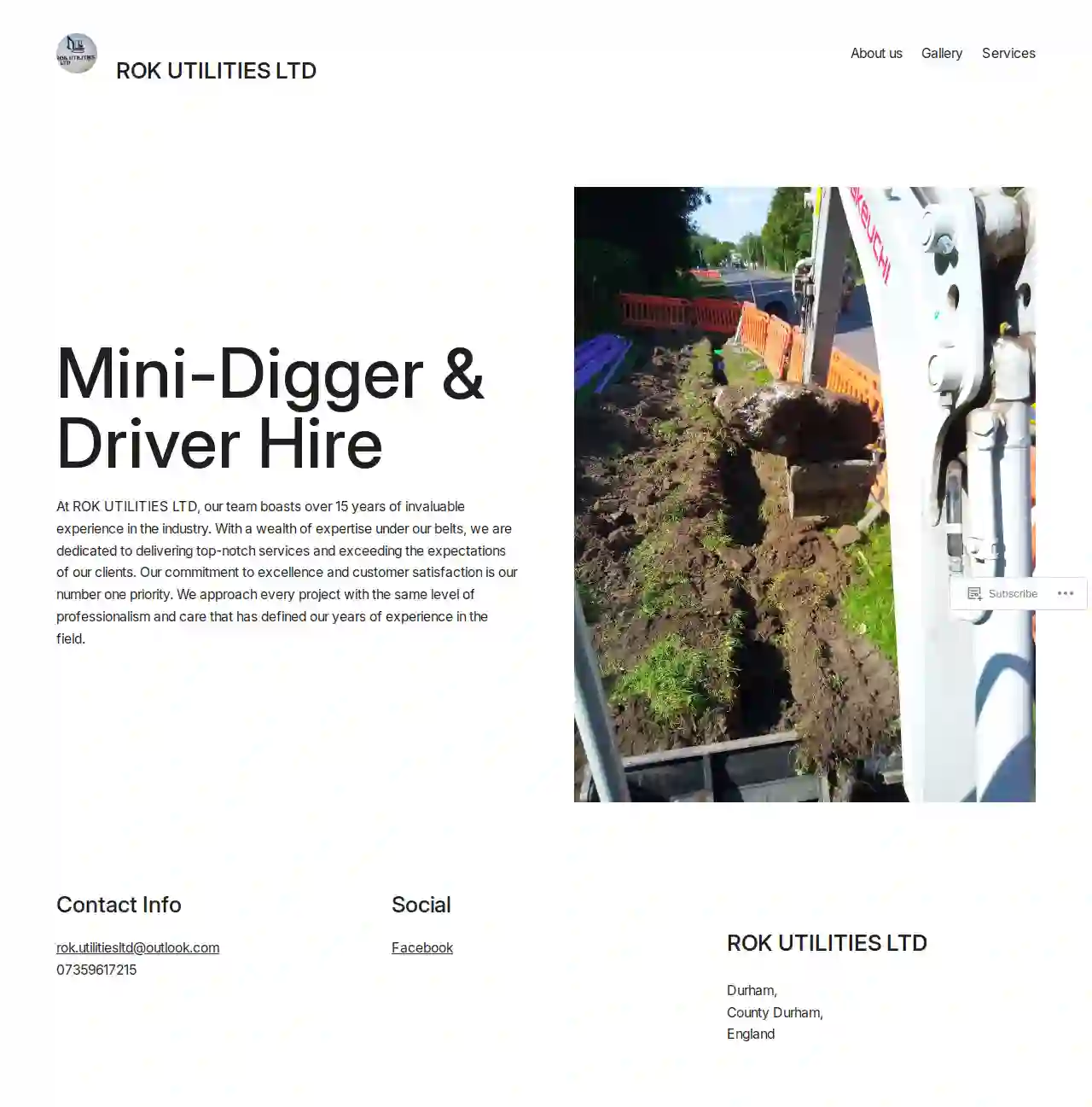Excavation Contractors Sacriston
Best Excavating Contractor in Sacriston
Receive up to 3 Land Excavation quotes for your project today! Compare profiles, reviews, accreditations, portfolio, etc... and choose the best deal.

Rok utilities ltd
51 reviewsDurham, County Durham, GBAbout ROK UTILITIES LTD At ROK UTILITIES LTD, our team boasts over 15 years of invaluable experience in the industry. With a wealth of expertise under our belts, we are dedicated to delivering top-notch services and exceeding the expectations of our clients. Our commitment to excellence and customer satisfaction is our number one priority. We approach every project with the same level of professionalism and care that has defined our years of experience in the field.
- Services
- Why Us?
- Gallery
Get Quote
JW Plant Hire & Excavation
54 reviewsDurham, GBJW Plant Hire & Excavation We are a reliable and hardworking family run business, located in County Durham. Providing excavation services and micro plant machinery hire, in and around the North East of England. I'm committed to providing a high standard of service. No matter the size of the job, I guide my clients every step of the way and offer highly competitive rates. Take a look at my services below and call me today to schedule an initial consultation.
- Services
- Why Us?
- Gallery
Get Quote
Brambledown Landscape Services Ltd
12 reviewsDurham, GBWelcome To Brambledown Brambledown Landscape Services Ltd have 50 years experience in providing Award winning commercial Landscape Environmental Improvement schemes across the UK. Our specialist Landscape work has vastly improved numerous public spaces, particularly Historic Parks, Community gardens, National Parks, Botanical Gardens and Town Parks. Recognising the time and money spent invested in these projects, Brambledown Landscapes have ensured that every Environmental Improvement scheme that we are involved in, meets our strict high level quality procedures in line with Achilles Building Confidence Level 4 Status, ISO 9001, Constructionline Gold & CHAS.
- Services
- Why Us?
- Gallery
Get Quote
Herrington Landscapes Ltd
522 reviewsDurham, GBHERRINGTON LANDSCAPES Bespoke garden design & installation With over 14 years of experience Herrington Landscapes can work with you to create a bespoke garden design & installation. Let us take care of your dream garden.
- Services
- Why Us?
- Testimonials
- Gallery
Get Quote
G M H Mini Plant Hire & Groundworks
High Hillside Farm, Houghton Le Spring, DH5 8BG, GBWelcome to G M H Mini Plant Hire & Groundworks, a trusted family-run business with a proud 9-year legacy. Serving Newcastle, Houghton Le Spring and beyond, we have earned an excellent reputation for plant hire and groundworks excellence. At G M H Mini Plant Hire & Groundworks, we provide professional and swift service, always maintaining the highest quality standards. Our communication with customers is exceptional, ensuring a smooth experience from beginning to end. A guarantee of superior work backs each project we undertake. Our business thrives on customer satisfaction and positive referrals. With a history of inventive designs, effective problem-solving, and attention to detail, we aim to meet and surpass the expectations of every customer. From minor domestic tasks to extensive commercial projects, we handle each job with precision and care. We are also proud members of the Construction Plant-Hire Association and hold certifications like the First Aid Awards Ltd Emergency First Aid at Work Level 2 Award and the Construction Skills Certification Scheme.
- Services
- Why Us?
- Accreditations
- Testimonials
- Gallery
Get Quote
GROUNDWORKS DIRECT LTD
2.712 reviewsDurham, GBWhat is Plesk? Plesk is a hosting panel with simple and secure web server, website and web apps management tools. It is specially designed to help web professionals manage web, DNS, mail and other services through a comprehensive and user-friendly GUI. Plesk is about intelligently managing servers, apps, websites and hosting businesses, on both traditional and cloud hosting.
- Services
- Why Us?
Get Quote- Ni
Nicholsons Plant hire
4.510 reviewsDurham, GB- Services
- Why Us?
Get Quote 
H. E. Services (Plant Hire) Ltd
53 reviewsDurham, GB- Services
- Why Us?
Get Quote- Le
Les Brown Excavating Ltd.
55 reviewsDurham, GB- Services
- Why Us?
Get Quote - Bi
Bishop Middleham Quarry
4.766 reviewsDurham, GB- Services
- Why Us?
Get Quote
Over 13,059+ Excavation Contractors onboarded
Our excavation companies operate in Sacriston & beyond!
ExcavationHQ has curated and vetted Top Excavation Companies arround Sacriston. Find the most trustworthy contractor today.
Frequently Asked Questions About Excavation Contractors
- Project Size and Scope: Larger, more complex excavations naturally take longer.
- Soil Conditions: Rocky or challenging soil types can slow down progress.
- Site Accessibility: Limited access might require more time for maneuvering equipment and hauling materials.
- Weather: Inclement weather can cause delays.
- Permitting and Inspections: Waiting for permits or inspections can extend the timeline.
- Trench Collapses: Unstable trench walls can cave in, posing a severe risk to workers. Proper shoring and sloping are crucial safety measures.
- Utility Damage: Striking underground utilities (gas, water, electric) can cause leaks, explosions, or electrocution. Accurate utility locates and careful digging are essential.
- Falling Objects: Materials or equipment falling into excavations can injure workers. Securing work areas and using appropriate safety gear is vital.
- Equipment Accidents: Operating heavy machinery involves risks of rollovers, collisions, or mechanical failures. Trained operators and proper equipment maintenance are critical.
- Environmental Hazards: Excavated soil might contain hazardous materials (asbestos, lead). Proper testing and disposal procedures are necessary.
- Project Type and Size: Ensure the contractor has experience handling projects similar to yours in scale and complexity.
- Reputation and Reviews: Check online reviews and testimonials, and request references from previous clients.
- Licensing and Insurance: Verify that the contractor is properly licensed and insured to protect you from liability.
- Equipment and Resources: Confirm that they have the necessary equipment and resources for your project's needs.
- Communication and Transparency: Choose a contractor who communicates clearly, provides detailed estimates, and keeps you informed throughout the project.
- Safety Record: Inquire about their safety protocols and track record to ensure a safe work environment.
- Price: While price is important, it shouldn't be the only deciding factor. Balance affordability with experience, reputation, and quality of service.
- Soil Type and Stability: Stable, cohesive soils allow for deeper excavations than loose or unstable soils.
- Groundwater Level: Excavations below the water table require dewatering techniques to manage water intrusion.
- Equipment and Resources: The size and capabilities of excavation equipment influence the achievable depth.
- Safety Regulations: OSHA and other safety regulations impose limitations on trench depths without proper shoring or sloping.
- Project Requirements: The purpose of the excavation (basement, pool, foundation) determines the necessary depth.
How long does an excavation project take?
What are the risks associated with excavation?
How do I choose the right excavation contractor for my project?
How deep can you excavate?
How long does an excavation project take?
- Project Size and Scope: Larger, more complex excavations naturally take longer.
- Soil Conditions: Rocky or challenging soil types can slow down progress.
- Site Accessibility: Limited access might require more time for maneuvering equipment and hauling materials.
- Weather: Inclement weather can cause delays.
- Permitting and Inspections: Waiting for permits or inspections can extend the timeline.
What are the risks associated with excavation?
- Trench Collapses: Unstable trench walls can cave in, posing a severe risk to workers. Proper shoring and sloping are crucial safety measures.
- Utility Damage: Striking underground utilities (gas, water, electric) can cause leaks, explosions, or electrocution. Accurate utility locates and careful digging are essential.
- Falling Objects: Materials or equipment falling into excavations can injure workers. Securing work areas and using appropriate safety gear is vital.
- Equipment Accidents: Operating heavy machinery involves risks of rollovers, collisions, or mechanical failures. Trained operators and proper equipment maintenance are critical.
- Environmental Hazards: Excavated soil might contain hazardous materials (asbestos, lead). Proper testing and disposal procedures are necessary.
How do I choose the right excavation contractor for my project?
- Project Type and Size: Ensure the contractor has experience handling projects similar to yours in scale and complexity.
- Reputation and Reviews: Check online reviews and testimonials, and request references from previous clients.
- Licensing and Insurance: Verify that the contractor is properly licensed and insured to protect you from liability.
- Equipment and Resources: Confirm that they have the necessary equipment and resources for your project's needs.
- Communication and Transparency: Choose a contractor who communicates clearly, provides detailed estimates, and keeps you informed throughout the project.
- Safety Record: Inquire about their safety protocols and track record to ensure a safe work environment.
- Price: While price is important, it shouldn't be the only deciding factor. Balance affordability with experience, reputation, and quality of service.
How deep can you excavate?
- Soil Type and Stability: Stable, cohesive soils allow for deeper excavations than loose or unstable soils.
- Groundwater Level: Excavations below the water table require dewatering techniques to manage water intrusion.
- Equipment and Resources: The size and capabilities of excavation equipment influence the achievable depth.
- Safety Regulations: OSHA and other safety regulations impose limitations on trench depths without proper shoring or sloping.
- Project Requirements: The purpose of the excavation (basement, pool, foundation) determines the necessary depth.